#DGA
Explore tagged Tumblr posts
Text
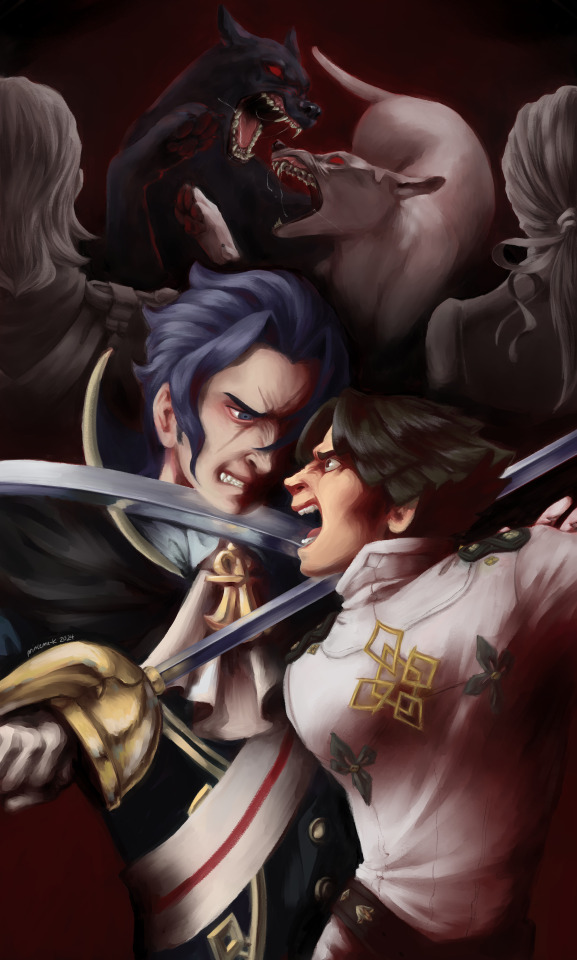
so draw your blade, you wretched fiend and let's you and i fight like the dishonourable dogs we are savage, violent, yet free and when the curtain calls, let me put you out of my misery
#mak art#mak draws aa#the great ace attorney#dai gyakuten saiban#tgaa#dga#tgaa spoilers#dgs spoilers#kazuma asogi#kazuma asougi#barok van zieks#klint van zieks#genshin asogi#genshin asougi#artists on tumblr#OW MY FUCIKIGN HAND#i took like a whole month on this. working on and off#never hyperfixate on a series set in the 20th century that makes u wanna draw in a style ur not good at#worst mistake of my life#i referenced a lot of chiaroscuro stuff for this#'the fallen angel' painting was used as ref for barok too#wanted to fit in a stronghart motif but#couldn't make it work w/o cluttering the whole thing tbh. so#(looking at bvz and kaz) ohhh they hate each other so much......... but they're mislead........ ohhhhhhh#also i hope to Never fucking draw or paint dogs again. Horrible#theres more stuff on the way. probably#one's a video but. i gotta rest first. im gonna Die#anyways. enjoy gang
306 notes
·
View notes
Text
SAG-AFTRA, Teamsters, IATSE, Writers Guild Issue Joint Statement in Solidarity with Directors Guild of America
May 31, 2023
Los Angeles, CA — As the Directors Guild of America’s negotiations with the Alliance of Motion Picture and Television Producers (AMPTP) enter their final scheduled week, the International Alliance of Theatrical Stage Employees (IATSE), the Teamsters, Hollywood Basic Crafts (Teamsters Local 399, IBEW Local 40, LiUNA! Local 724, OPCMIA Local 755 and UA Local 78), the Writers Guild of America East (WGAE), the Writers Guild of America West (WGAW), and the Screen Actors Guild-American Federation of Television and Radio Artists (SAG-AFTRA) stand alongside our sisters, brothers, and kin in the DGA in their pursuit of a fair contract.
We believe in a Hollywood where every worker is valued and their contributions recognized, whether their labor is on or off screen. A fair contract for directors does not benefit just a select few; it uplifts every worker in the film and television industry and acknowledges the interconnected nature of our work. We call on the AMPTP to immediately negotiate a fair agreement that addresses the Directors Guild of America’s unique priorities in good faith.
As eyes around the world again turn towards the negotiation table, we send a clear message to the AMPTP: Our solidarity is not to be underestimated. The Hollywood guilds and unions stand united, and we stand strong.
In solidarity,
Matthew D. Loeb International President, IATSE
Lindsay Dougherty Motion Picture Division Director & Western Region Vice President, Teamsters Hollywood Basic Crafts, Chairperson
Duncan Crabtree-Ireland National Executive Director and Chief Negotiator, SAG-AFTRA
Michael Winship President, Writers Guild of America, East
Meredith Stiehm President, Writers Guild of America West
2K notes
·
View notes
Text
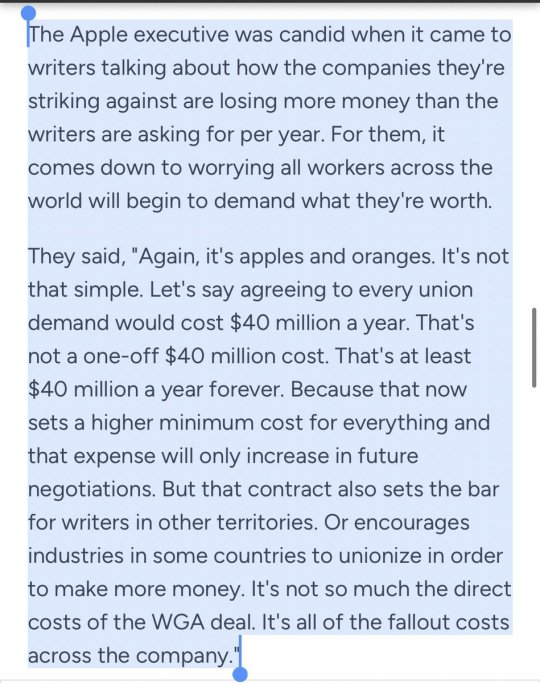
#hollywood#sag#sag aftra#south korea#unions#workers rights#poc#woc#netflifx#apple#dga#los angeles#Squid game#asia#squid games
1K notes
·
View notes
Text

James Bobin has been nominated for the DGA Award for Outstanding Directorial Achievement in Children’s Programs for 2023 for the first episode of Percy Jackson and the Olympians!
#james bobin#dga awards#dga#percy jackson#pjo#percy jackson tv show#pjo tv show#percy jackson and the olympians
438 notes
·
View notes
Text
Looks like Steven DeKnight (Daredevil, Buffy, Angel) also agrees they should be asking for more. (DGA version)
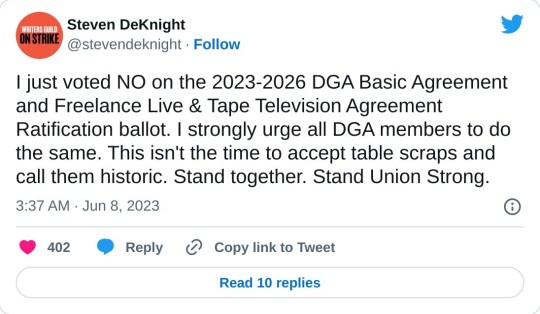
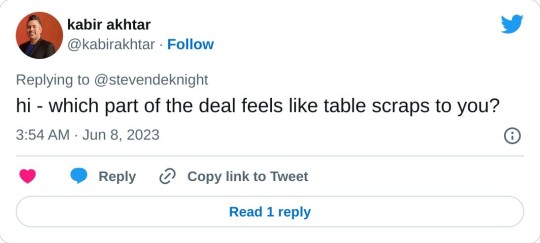
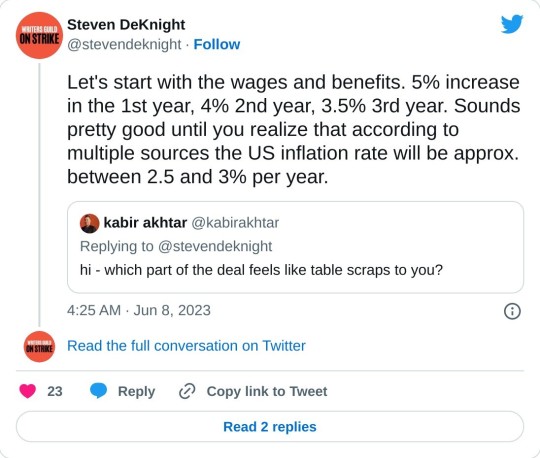
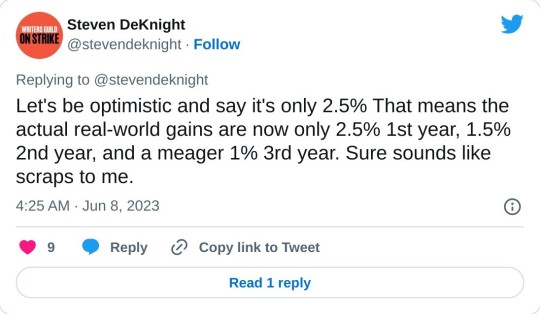
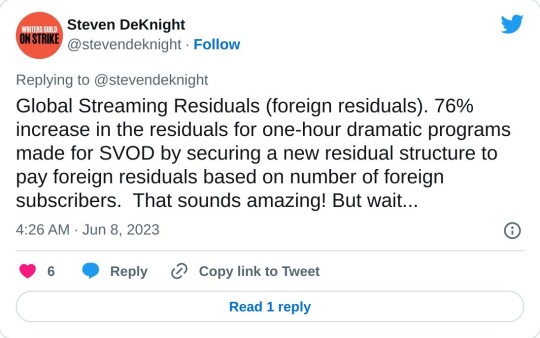
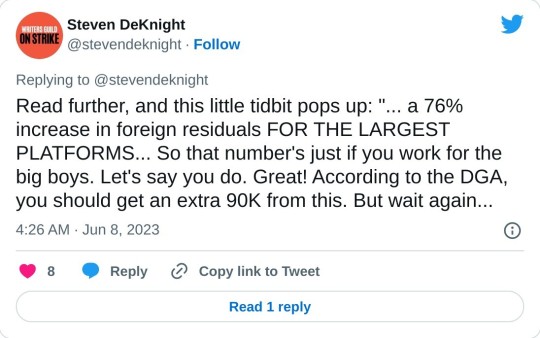
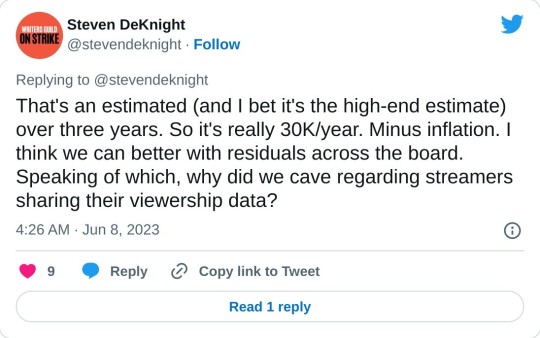

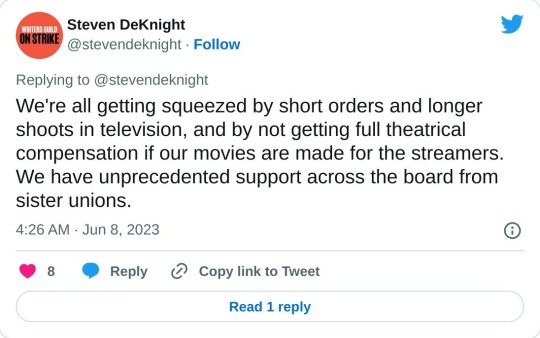
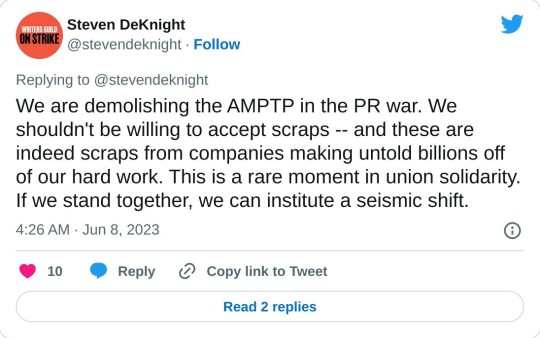
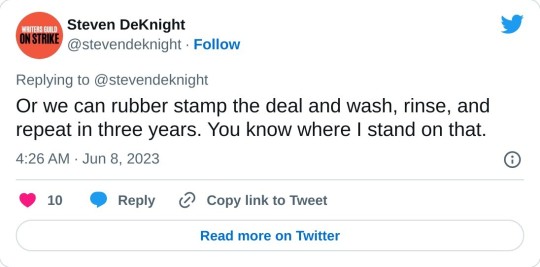
Stand strong, DGA, and vote No!
#steven deknight#daredevil#btvs#angel the series#buffy the vampire slayer#wga strike#wga strong#dga#directors guild of america#dga strong
979 notes
·
View notes
Text
The Professor Case - Three Sad Faces and Three Dead Men
There is a man in your life you love, admire and respect more than anything. Your greatest desire is to follow in his footsteps, and to eventually make him proud. However, before that can happen, he tragically dies under obscure circumstances. You’d do anything to know what happened; to give him some sort of justice. But the more you know about the truth, the more you realise that maybe he wasn’t as noble as he always appeared. Before his death, he left you a letter that you didn’t receive.
Are you Barok van Zieks, Asougi Kazuma or Gina Lestrade?
The heart of the drama of the Professor case is made up by this series of cascading tragedies, where each is both a repetition of and directly caused by its predecessor. The cycles of betrayal, disillusionment and grief play out in delayed motion across time, the same story with different characters wound to different speeds so they all come crashing to their endpoint at once. The spiral of repetitive continuation joins the three tales both into one continuous history, and also the same tale interposed three times upon itself. Kazuma’s story cannot begin without Barok’s coming to its first temporary end, just as Gina’s cannot without Kazuma’s catalysis. Yet as we line up Gina, Kazuma and Barok, we see the same face, displaced across time – tearful and shocked, furious and vengeful, bitter and resigned. In the same way, we see Klint layered over Genshin layered over Gregson: deeply loved, sharply fallen, and dead.
This triangulation, more than anything else, emphasises the game’s thematic throughline that the past cannot be put to rest without the truth. Klint’s lies become Genshin’s lies become Gregson’s lies, just as Barok creates Kazuma creates Gina. Past, present and future collapse into a grief that endlessly reproduces itself. The impossibility of moving forwards when the threads of bewilderment and doubt remain manifests itself in the literal reiteration of the event, again and again. Time loops between the courtroom and the graveyard. The years pass. The years do not pass.
In this temporal overlap, Gina articulates the grief that wells beneath Barok’s bitterness and Kazuma’s sharpness, while Kazuma’s single-minded vengeance is a warning as to how easily that grief might be shaped into a sword, and Barok shows by example what lies at the end of that path: ten years later still unhappy, still chained. As they come together in the courtroom, Gina in the witness stand, Barok in the dock and Kazuma at the prosecution’s bench, it is a symbolic trial of not the self, but the role. To leave one of them still trapped in the morass is somehow to leave all of them – their shackles, after all, are the same. The question that passes between them, from corner to corner is this: is it a crime, to have grieved so deeply that your grief became a weapon? The outcome of the trial doesn’t quite answer this question. It asks another instead: is grief grounds for justice? And crucially: who was holding the weapon that grief made of you?
However, of this unhappy triangle, Barok is the only one to have actually completed the climactic, mistaken, mistrial of justice. He is the only one to have received closure at the cost of integrity, and to have lived with the aftermath. He is the only one to not only have believed he knew the truth, but also that he had delivered justice. While Kazuma stands on the cusp, and Gina is literally at ground zero, Barok has both the advantage and misfortune of hindsight. Hindsight – and reflection. He hasn’t escaped his story. But he has walked out the other way, into what he believes is the long epilogue, when it’s in fact just the sagging middle. It’s what allows him sharp, pointed insight into the other two: he recognises himself in their faces.
Van Zieks: I say nothing of whether or not I'm the Reaper. That's the task of this court to decide. But there is one thing I can say unequivocally: That girl is no detective.
Gina: Eh? Wha...? Nah, that's right, I ain't. I'm an inspector!
Van Zieks: Repeating rumours heard around the Yard... Reading entries from a notebook of unconfirmed origin... That's not testimony. It's practically a script. No doubt the rest of this trial will go exactly as you've clearly planned.
Kazuma: .........
Van Zieks: Your hatred of me is understandable. In your mind, I'm sure I am the Reaper...who sent your father to the gallows all those years ago.
Kazuma: ...!
Van Zieks: But you're in danger of becoming a far more sinister Reaper yourself... ...by attempting to have me condemned with this feeble excuse for testimony.
The ease with which Barok identifies the truth is striking. This is a scripted trial. Gina’s grief is causing her professional integrity to fall apart, a fact that Kazuma is using to indict Barok. Kazuma’s anger is causing his professional integrity to fall apart as he treats the courtroom like his personal arena for revenge. Kazuma’s anger, Barok demonstrates, is something he understands, deeply. Gina’s grief is something to this day he mirrors. Yet, Barok harshly points out, emotion is no excuse for a miscarriage of justice. It’s a show of both deep understanding and scathing judgement. The cool-eyed detachment with which he evaluates the situation is admirable. It is also something Barok from ten years ago would not have been able to do.
However, there is a fatal flaw in all this, which is that it’s much easier to recognise when an accusation is false from one end than the other. As ever, Barok stops just short of applying the same tier of insight into the events of ten years past, looking just to the left of the gaping wound that the trial left. Even as more and more irregularities come to light, it is only at the final push that he truly faces to the idea that this one trial could have been a massive pile of lies. This is an incredible blind spot, coming from the man who espouses he ‘trusts no one’, who has the both the suspicion and the deductive ability to find out Gregson’s position as the Reaper. It is an incredible blind spot, coming from the man who had the clarity to suspect, even for a moment, his own, dear, brother.
It's here that we see Barok’s true weakness – and the damning piece of evidence of how deeply he is still chained to that moment, ten years ago. Can a prosecutor of Barok’s calibre truly never have suspected, if not at the time, then ten years later? Even as Sithe’s lies came to light, even as Gregson’s involvement in the Reaper became apparent? But as Barok rejected Klint’s guilt, so he rejects that the events were not as he believed them to be: on the basis of evidence, to be sure, but evidence given disproportionate weight for how much he did not want it to be true. Even as Kazuma desperately links every piece of evidence, no matter how unfitting, into his certain conclusion that Barok is Gregson’s killer, so Barok takes what evidence he receives and slots them neatly into the narrative he most wants to believe: this man died so my brother cannot be guilty, the ring was found so Genshin must have committed the crime. He refuses to entertain alternative pathways, even as doubt creeps in. Even as things stop fitting. Until the very last moment, when he is forced with damning evidence to change his stance, he clings to his brother’s innocence. Within him grind the cogwork of his truth-seeking logic machine mind against the bloodied flesh of his heart. After ten years, that flesh is wearing thin.
It's this that brings him to the exact same level as Kazuma and Gina, who fight for Genshin and Gregson’s innocence respectively. However, it cannot all be true at once. All three cannot be innocent together: something has to give. As each of them beseech Ryuunosuke for comfort, they find instead the truth.
But let’s step back a little. The similarity between Gina, Kazuma and Barok make the differences in how they are treated startling. Barok, on displaying a lapse in professional integrity following the worst events of his life, receives full prosecutorial authority from Stronghart to go head-to-head in the trial of his brother’s death. Meanwhile, Stronghart allows Kazuma to slide in sideways, using Gregson as a cudgel to pin Barok for Genshin’s death. But Gina, when she breaks down in court and cries out that Gregson is innocent, is harshly reprimanded and told to hand in her badge. Why the difference?
The answer is obvious: a noble young prosecutor is a much more useful tool to Stronghart than a barely literate pickpocket from the streets of East London. The debt Barok owed to Stronghart protected Stronghart from suspicion for nearly ten years, while enabling Stronghart to centre an entire conspiracy around Barok in the blind spot that debt created. Similarly, Kazuma is a useful tool to wipe out the Reaper conspiracy’s last members and exonerate Stronghart once and for all while being easily disposed of as a foreign exchange student. But what’s Gina got to give? What value does Gina have that Stronghart might find useful? The answer is: nothing. Gina has nothing, and so it’s her that Stronghart lets loose on his distaste, his condescending dismissal. It’s her that he belittles and talks over – that his true feelings for those he has used comes out.
Barok is the first and most perfect paradigm of the narrative that the other two emulate. Immediately after his brother’s death, he seeks out the culprit (so he thinks) and prosecutes him successfully in court for the crime which he seeks vengeance for. Kazuma is a little shakier: ten years after his father’s death, he seeks out the culprit (so he thinks) and prosecutes him on the basis of an unrelated crime while barely hiding that his real reason is his father’s death. It’s with Gina that the real tears in the fabric show: disoriented and grieving, she’s dragged into court and gives emotional testimony that implicates someone she’s not even 100% sure is guilty. She isn’t even the one doing the prosecuting. These are different stories, with the difference in perfection scaled primarily by how perfect a tool Stronghart sees in them. But they are also the same story, dressed better or dressed worse. And they reach the same ending.
When the dust finally begins to settle, we zoom into how each of them react to the momentous change in their understanding of their own lives. Standing before Klint’s portrait, Barok takes the painful step to acknowledge that his brother is truly ‘no more’, even as he wears his prosecutor’s badge with mixed feelings to the complex legacy left behind. Kazuma entrusts Karuma to Ryuunosuke with the promise to retake it after mastering the violence he suddenly realised he was capable of. But Gina, surrounded by her friends, takes back Gregson’s pocket watch and vows to uphold his legacy by becoming a great detective herself.
At first glance, this raises a lot of question marks. Has everyone forgotten that Gregson was involved in a double-digit number of murders? Well, to some extent, yes. However, from another perspective, while Barok has to grapple with the person he became in upholding a false legacy, while Kazuma has to grapple with the person he felt the potential of being in chasing a false vengeance, Gina had not yet taken the steps towards becoming an upholder of falsehoods herself, wittingly or unwittingly. It is with this uncomplicated sincerity that she can take on Gregson’s legacy, since it never yet had the chance to twist her into bitterness or hatred – as it did to Barok, and as it did to Kazuma. While she may have to grapple with Gregson, she does not have to grapple with herself. In the worst time of their lives, Barok had Stronghart, who plunged him into a ten-year long darkness and scapegoated him as the Reaper. Kazuma had no one, only memories, and anger enough almost to kill. But Gina had Ryuunosuke, and through him, the truth – for all.
#tgaa#dga#the great ace attorney#dai gyakuten saiban#gina lestrade#barok van zieks#kazuma asougi#kazuma asogi
37 notes
·
View notes
Text

DO NOT separate ⤴
#asoryuu#chuunosuke#nyasougi#nyasochuu#illsutration#great ace attorney#dga#ace attorney#great ace attorney chronicles#ryunosuke naruhodo#kazuma asogi#kidcore#my art#digital art#artists on tumblr#asoryu
395 notes
·
View notes
Text


ayo’s nominated for outstanding directing at both the DGA and NAACP awards! deserved💛
21 notes
·
View notes
Text


“There was a moment in the Andor FYC where the presenter was playing a clip of Andy Serkis’ big monologue, and as they screened it, Diego Luna got out of his chair and sat on the ground so that he didn’t block the crowd’s view of his colleague’s scene. It was humble, thoughtful and professional.” -Doc Wyatt, DGA
303 notes
·
View notes
Text
I think it'd be really funny if the WGA and SAG-AFTRA strikes continue through the Emmy's. I want them to get the pay they're deserved of course but if studios are gonna keep being shit, I want them to feel the emptiness of the awards without half the people there. And if the DGA get in on this, ohohohoho.... It'll just be delicious...
256 notes
·
View notes
Text
THE BEAR THIS WEEK FAVORITES ROUNDUP










#golden globes#golden globes 2025#the bear#carmy berzatto#sydney adamu#carmy x syd#love#sydcarmy#slow burn#romance#relationship#ayo edebiri#Jeremy Allen white#ebon moss bachrach#liza colon zayas#ayomy#jayo#dga#dga awards#director's guild award#director's Guild of America award ayo Edebiri#mirroring is an act of love#tiye amenechi ayo Edebiri#tiye amenechi#biggtiye
16 notes
·
View notes
Text
Ayo Edebiri has received a Directors Guild of America nomination for Outstanding Directorial Achievement in a Comedy Series for Napkins.
Other The Bear nominees in the same category are Duccio Fabbri for Doors and Christopher Storer for Tomorrow.


#ayo edebiri#the bear#the bear fx#the bear hulu#the bear napkins#first time director#directors guild of America#DGA#award nominations#directors
14 notes
·
View notes
Note
Why is the DGA not striking? Are their working conditions that much better?
That's a great question! The short answer is no, their working conditions aren't much better. Their supposedly "historic" 2023 deal isn't very good, especially around AI protections. They just have leadership that isn't interested in striking.
Some history: During the most recent writers' strike in 2007-08, the directors' guild negotiated a deal that many saw as undercutting the WGA strike. Similar things happened in earlier strikes: the DGA takes a deal while the WGA puts their necks out to strike for a better contract. So this happening again in 2023 wasn't surprising to anyone in the industry!
Now, while the WGA and SAG-AFTRA are on strike, the directors can... twiddle their thumbs? Or hopefully join their sister unions on the picket lines even though their leadership will be twiddling their thumbs?
At least the memes are good.
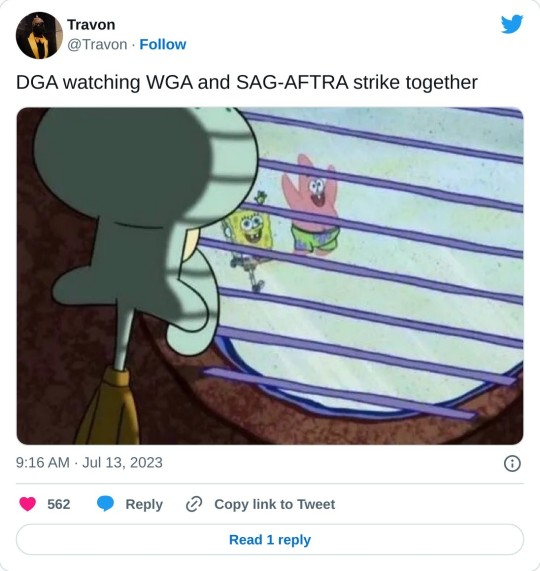
[image ID: Tweet by Travon @/Travon of the spongebob meme of Squidward looking out through a barred window while Spongebob and Patrick are frolicking. The text says "DGA watching WGA and SAG-AFTRA strike together." end ID.]

[image ID: tweet from Americana At Brand Memes @/americanamemes that says "LA this summer!" attached is an image of King Ghidorah from Godzilla, a three-headed dragon: the two heads labeled WGA Striking and SAG Striking are serious, scary dragons, while the one labeled "DGA's 'historic' deal' has cross-eyes and a tongue sticking out. end ID.]
634 notes
·
View notes
Text
𝘿𝙖𝙫𝙞𝙙 𝙇𝙮𝙣𝙘𝙝 🪵🪚
youtube
youtube
youtube

#david lynch#david lynch rip#david lynch forever#twin peaks#art#surrealism#usa#flashback#academy awards#oscars#film#cinema#movies#hollywood#dga#americana#american gothic#afi#imdb#Youtube
9 notes
·
View notes
Text
MY 2c ON THE DGA DEAL*
So, the DGA cut a deal with the AMPTP. There are definitely some writers who are upset about this, but TBH I'm not one of them. Because...
DGA gonna DGA. I always knew they'd use our strike as leverage to cut a deal. The question was if the WGA can use that deal to establish pattern bargaining for what we needed, and they actually seem to have addressed 3 of our big issues so good on them. 2 more than I thought!
For all intents and purposes, the DGA is structurally incapable of striking, so they were always going to play good cop to us "crazy writers" to maximize their gets. They got foreign streaming residuals, AI, and some gains in comedy and variety.
In all likelihood, the WGA can get all of the above now with pattern bargaining (once SAG is either done or on strike). They also got some gains against free work, which is promising. That leaves only a few things we need on the table, which is good for us.
In a lot of ways, this is the best-case scenario, even though it probably stings for some who hoped they'd go out with us. That was never going to happen. Because, like I said... DGA gonna DGA.
And at this point in my life and career, there are some mistakes I think I know better than to make.
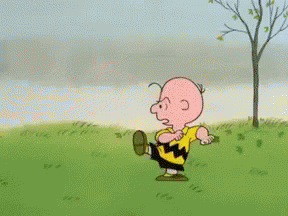
*Arguably not even worth 2c.
161 notes
·
View notes
Text
Fuck HBO/MAX
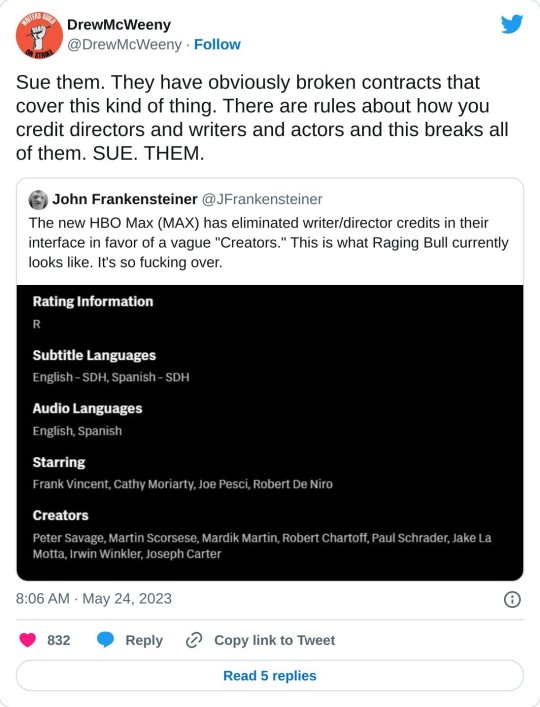
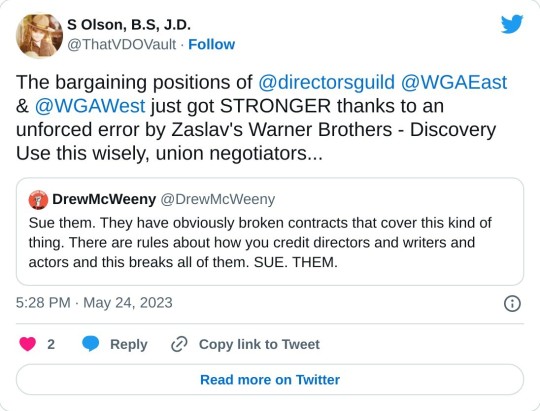
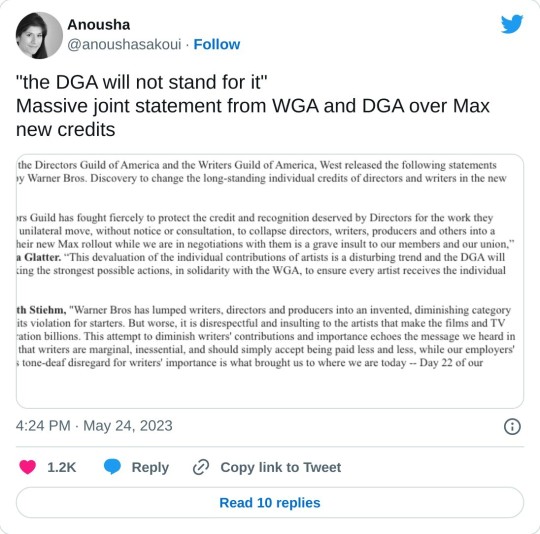
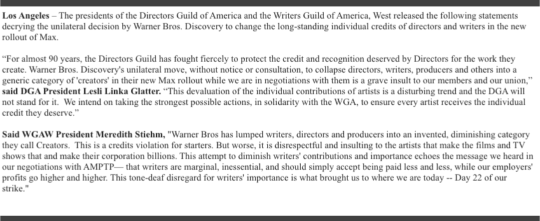

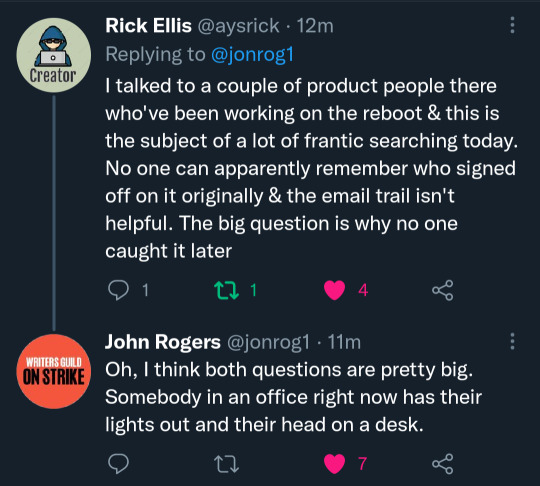

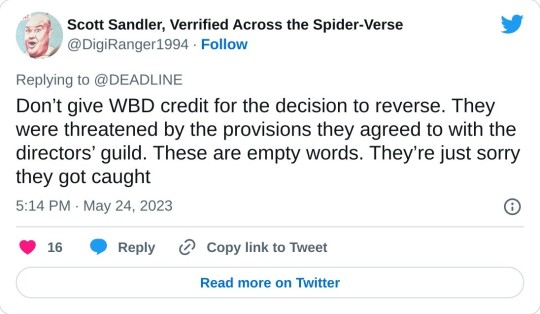
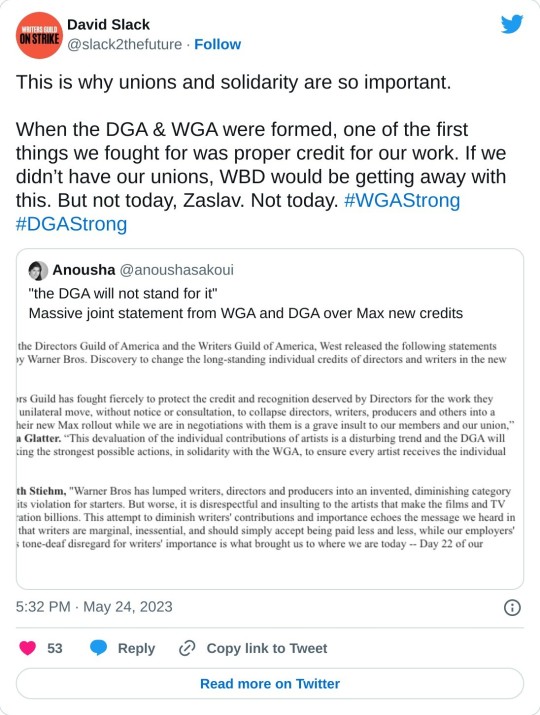
#warner bros#warner brothers discovery#hbo#hbo max#max#wga#wga strike#wga strong#dga#writers guild of america#directors guild of america
394 notes
·
View notes